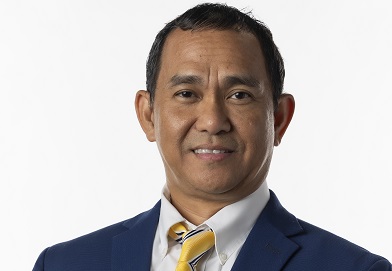Dr. Armiel Suriaga

Nurturing a Passion: Dr. Armiel Suriaga's Journey in Nursing and Research
For Dr. Armiel Suriaga, the path to nursing started after receiving a scholarship from the Iloilo Society of America and encouragement from his sponsor in the program, just as he was graduating high school in the Philippines.
As an architectural drafting student, nursing was not an obvious choice for him at first, but the idea that he could care for the sick and vulnerable ultimately attracted him to the field.
“This passion has guided my journey and shaped my professional and research interests,” Dr. Suriaga explained.
An assistant professor at the Christine E. Lynn College of Nursing, Dr. Suriaga loves to teach and is honored to be considered a role model by students, both as a mentor and a researcher.
“A student once approached me, saying, “’I want to be like you,’” Dr. Suriaga said, reflecting on a touching moment in his career. “This is one way to model caring: being invested in the student’s success and learning.”
In his teaching, he tries to simplify complex concepts, always respond to students’ inquiries, and support their educational journey. A graduate of Florida Atlantic and Harvard University, among other institutions, Dr. Suriaga shared that he received tremendous support in his academic journey and wants his students to experience the same opportunities.
His research focuses on substance use, misuse and abuse, currently including cannabis research, as well as opioids, kratom and ethanol.
“I am interested in examining the associations of these substances to drug intoxication and gun-related fatalities,” Dr. Suriaga said, adding that he is searching for innovative strategies for harm reduction and prevention applications. His interests also include the understanding of the social determinants of health in the context of substance use.
In addition to collaborating with fellow faculty members at Florida Atlantic, he also works with researchers from Harvard University, Yale, the University of Florida, and the Medical College of Wisconsin.
Dr. Suriaga noted that his published work on cannabinoids led to media coverage and invitations to speak about his research at various professional organizations, including the American Cannabis Nurses Association and Yale School of Nursing.
While receiving the attention for his research has been encouraging, Dr. Suriaga hopes the true impact of his work would be in substantial reduction in drug intoxication and drug-related mortality and safer communities for all.
In his work with Sigma Iota Xi at-Large Chapter, Dr. Suriaga helped students get involved in community service, leadership internship programs, and ongoing research projects.
“In my nursing research class, our group projects culminated in a poster presentation for Sigma Research Day, which aimed to enhance students’ involvement in research,” he said. The opportunity inspired some of the students, he added, to stay in the Honors Program, receive mentorship and continue working with nursing faculty conducting research.
Dr. Suriaga is active at local health fairs and other community events, providing health check-ups and vaccinations to residents.
“These engagement experiences add valuable lessons when I teach pathophysiology or conduct research, particularly participant recruitment and interviews,” he remarked. “Being involved in the community through education dissemination or volunteer work provides the opportunity to learn about the participants, the community characteristics and other stakeholders, which are essential in teaching and research.”
